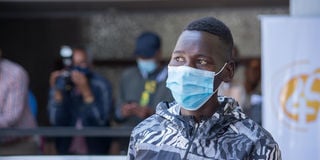A year later, our sportsmen and women have bravely borne the ravages of Covid-19

Solomon Boit, the 2019 East Africa Secondary Schools Championships 10,000 metres champion, during the 20th Great Ethiopian Run pre-race press briefing in Addis Ababa on January 8, 2021.
What you need to know:
- It is a year since Kenya recorded its first confirmed case of Covid-19 and athletes, just like people in other sectors of the economy, have lost a source of livelihood
- Notably, Kenyatta ordered all learning institutions to send learners home, announced suspension of all sporting activities, and suspended air flights from countries with Covid-19 cases
- A year later, non-contact sports have resumed globally, but most international athletics competitions remain postponed
Counsellors tell us that when you have hit rock bottom, the only place you can go is up. Whereas rebuilding from scratch is a slow, painful process which is often easier said than done, giving up eliminates every chance of success.
A year down the line since Covid-19 happened, Kenyan sportsmen and women have bravely borne the ravages of the pandemic. They are not at the bottom of the pit into which Covid-19 pushed them a year ago, but they are not out of it either.
It is a year since Kenya recorded its first confirmed case of Covid-19 and athletes, just like people in other sectors of the economy, have lost a source of livelihood. Careers have been put on hold, sponsorships lost and some dreams either shattered or suspended indefinitely.
From my conversations with some local sportsmen and women, survival has become a daily preoccupation for those who have not resumed competitions since Covid-19 disrupted sporting activities globally, leading to postponements or outright cancellations. Sports and related industries such as travel, tourism, hospitality, and media broadcasting have suffered great deal.
A UN report titled “The impact of COVID-19 on sport, physical activity and well-being and its effects on social development” which was published last year estimates the global value of the sports industry at US$756 billion (Sh82.9 trillion) annually.
“In the face of Covid-19, many millions of jobs are therefore at risk globally, not only for sports professionals but also for those in related retail and sporting services industries connected with leagues and events, which include travel, tourism, infrastructure, transportation, catering and media broadcasting, among others. Professional athletes are also under pressure to reschedule their training, while trying to stay fit at home, and they risk losing professional sponsors who may not support them as initially agreed,” the report states.
A day ago last year, a hush fell over many Kenyan households when Health Cabinet Secretary Mutahi Kagwe stood on the steps of Harambee House and announced that Kenya had recorded its first confirmed case of Covid-19.
On March 13 last year, Kagwe, flanked by other cabinet secretaries, said a lady who had travelled back to Nairobi from USA via London eight days earlier had been confirmed to be positive for coronavirus on March 12.
Among other containment measures, Kagwe announced the suspension of all public gatherings, meetings, religious crusades and school games but schools remained open and church services were allowed to go on as long as there was proper sanitisation and handwashing.
But two days later, a President Uhuru Kenyatta announced that Kenya had registered two more cases of Covid-19. Wearing a somber mood on the steps of Harambee House and flanked by cabinet secretaries of Health (Kagwe), Education (George Magoha), Interior and Coordination of National Security (Fred Matiang’i), ICT (Joseph Mucheru), Tourism (Najib Balala), Foreign Affairs (Raychelle Omamo) and other senior government officials, President Kenyatta announced more containment measures.
Notably, Kenyatta ordered all learning institutions to send learners home, announced suspension of all sporting activities, and suspended air flights from countries with Covid-19 cases.
Along the way, major sporting events were either cancelled or suspended globally to safeguard the lives of sportsmen, officials and fans. From marathon races to football tournaments, athletics championships to basketball games, handball to ice hockey, rugby, cricket, sailing, skiing, weightlifting to wrestling, no sporting event was spared.
The postponement of 2020 Olympic Games has been particularly costly. It is projected that the Games will cost Japanese government US$2.8 billion (Sh307 billion) over and above the original cost of US$12.6 billion (Sh1.381 trillion).
While Covid-19 was ravaging the world, our athletes took to baking cakes, farming, making bricks, among other things. A year later, non-contact sports have resumed globally, but most international athletics competitions remain postponed. We shall emerge stronger.




